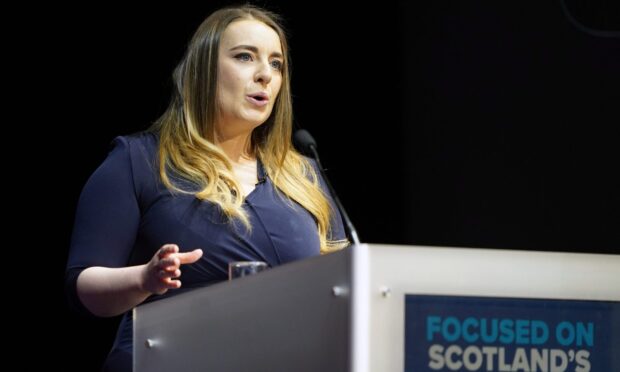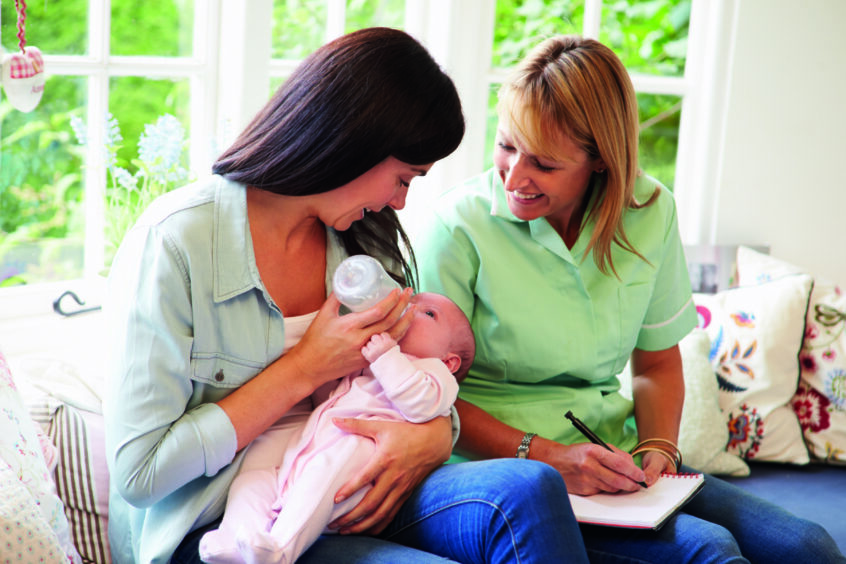
Scottish Conservative deputy leader Meghan Gallacher has revealed her daughter Charlotte did not receive routine health visits for 10 months, as concerns grow over a national staffing crisis.
The Central Scotland MSP says she also had no consistency over her care during her pregnancy and first few months as a new mum, with three different midwives and two separate health visitors being assigned to her family.
It comes after we revealed mums and babies are being put at risk with routine check-ups being scrapped for up to a year in some areas.
The visits allow highly trained professionals to visit a family’s home and check on the development of the child, as well as look for signs of abuse or distress.
Charlotte, who is now 19 months old, did not have a single routine visit between three months and 15 months because of what the visiting team described as an “oversight”.
Gallacher told The Sunday Post this brought the issue to her attention and she soon noticed mums on breast feeding forums raising similar experiences and questioning whether it was normal.
She said: “People have started to question the service and that’s something I did too. I thought maybe they wouldn’t come to me anymore because everything is okay.
“In hindsight, I probably should have made contact but as a new mum your life is so busy that you just sort of get on with it.
“But that doesn’t stop post-natal depression developing in some cases. It doesn’t stop you wondering about the health and wellbeing of your child.”
Services stretched to breaking point
Gallacher’s health visits were handled by NHS Lanarkshire.
The health board told us it has implemented the health visiting pathway – the minimum number of visits set out by the government – “with at times temporary amendments due to workforce challenges”.
But Gallacher fears more mums may have been put in the same position as the service is stretched to breaking point across the country.
Our investigation established that at least three more health boards are failing to meet the minimum standard.
Charlotte’s missing visits would have covered a number of key development milestones, including the introduction of solid foods.
Gallacher said support at that stage could be vital for new mums who do not have close family or friends to help them.
She said: “As a new parent, you sometimes are a little bit apprehensive about letting your baby try something new because you don’t want it to go wrong.
“I think that was how I felt for a long time. I’m so fortunate that I’ve got an amazing fiancé who was able to help me.
“Other people don’t have a strong support network around them, they don’t have friends and family close by.
“That’s why it’s so important that they are seeing a health visitor that’s consistent.”
The Tory MSP said every health visitor she has been assigned has been wonderful but she is concerned staff shortages make it more difficult for them to build the relationships necessary to spot issues early.
Relationships vital for care
The Royal College of Nursing Scotland told us regular visits are essential to ensure any concerns are picked up quickly.
Gallacher said: “It was only at the end of my pregnancy that I was able to build a relationship with a really wonderful midwife.
“I’ve had two different health visitors and the one who phoned to make an appointment at 15 months, she was filling in for someone who was off sick.
“It shows you the relationship actually isn’t getting established because of these shortages. They’re just trying to fill in as many gaps as they can.
“People aren’t getting the service they expect but it must also be so hard for the people working in the profession because they’re not able to establish the relationships they need to do their jobs.”
The Scottish Government says health visiting remains a universal service and the latest publish data shows the vast majority of eligible children are receiving key health contacts between 10 days and five years of age.
However, figures from Public Health Scotland show almost 4% of babies of aged 10-14 days did not receive these visits.
That increased to more than 8% for 6-8 weeks, more than 10% for both 13-15 and 27-30 months, and almost 23% for children aged 4-5 years.

Enjoy the convenience of having The Sunday Post delivered as a digital ePaper straight to your smartphone, tablet or computer.
Subscribe for only £5.49 a month and enjoy all the benefits of the printed paper as a digital replica.
Subscribe
